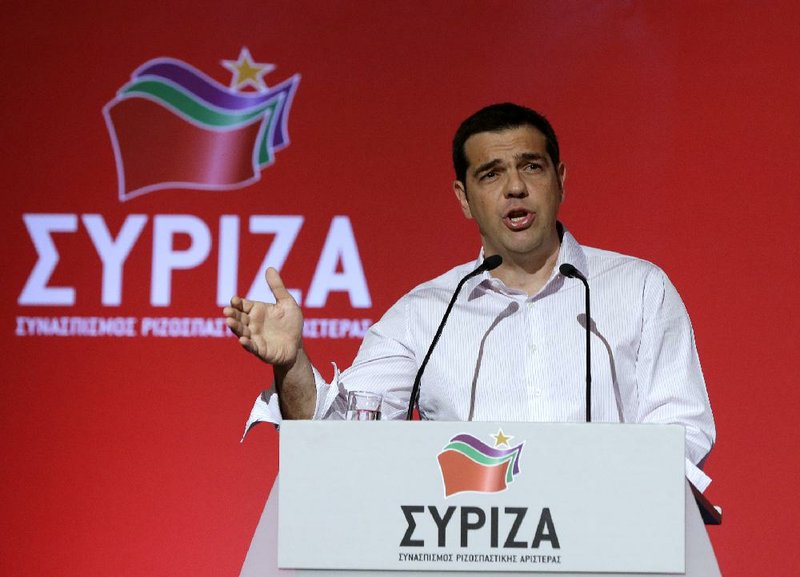ATHENS, Greece -- Greek Prime Minister Alexis Tsipras on Thursday called for a vote within his party to decisively sideline party members opposed to the rescue deal.
The radical-left Syriza party members would be asked in the vote, set for Sunday, whether they accept his plans to reach a deal on a package of loans from creditors in exchange for more tax increases and budget savings.
The party members' constant opposition threatens to splinter the party and government and has raised the possibility of fresh elections in the autumn -- which would create new uncertainty just as the country tries to get its economy back on its feet.
Addressing the party's 200-member decision-making body, Tsipras likened the vote to putting "the pin back in the hand grenade."
"We have to agree that we can't go on this way," Tsipras said, adding that "the absurdity of this peculiar and unprecedented dualism" within the party must stop.
The vote could precede an extraordinary party congress in September, when the Greek government hopes to have concluded the rescue agreement, strengthening Tsipras' hold on power.
In two successive votes in parliament this month, nearly a fourth of Syriza's lawmakers refused to support new austerity measures demanded by creditors before a third bailout deal worth an estimated 85 billion euros can be sealed. At the current exchange rate, 1 euro equals $1.09.
Far-left dissenters argue Syriza has abandoned its principles over the past six months under the country's prime minister. They have openly voiced support for Greece to turn its back on the euro as its national currency.
Panagiotis Lafazanis, recently fired as energy minister in a reshuffle, called for Greece to return to a national currency.
"An exit from the euro ... in spite of all the dark propaganda, would in no way be a disaster," Lafazanis told supporters in Athens this week.
Tsipras rose to power in January on an anti-austerity platform after a public backlash against years of tax increases and wage cuts. He formed a government with the smaller, right-wing party Independent Greeks, which agreed with his anti-austerity policies.
But after months of fruitless talks with creditors, the 40-year-old Syriza leader accepted another batch of austerity measures during a summit of eurozone leaders earlier this month on fears the country would be kicked out of the common currency.
Tsipras said he managed to win softer terms and clinch a pledge from other leaders to discuss ways of easing Greece's debt.
Government spokesman Olga Gerovasili said "differing strategies" within the party over Greece staying in the euro cannot be reconciled.
She said it's up to members whether they'll join with the party's majority or "follow a different path."
Opposition parties are propping up Tsipras' coalition government long enough to negotiate a new bailout and keep the country in the eurozone.
Lead bailout negotiators were due in Athens later Thursday. They will intensify a new round of talks for a large third rescue package after Athens and lenders from other eurozone countries reached a bitterly fought compromise. Talks so far have focused largely on tax changes, a planned overhaul of labor market regulations and efforts to simplify bureaucracy for new businesses, as well as attempts to limit an expected recession through 2016.
Before Thursday's party executive meeting, Tsipras acknowledged that Syriza was still adapting to becoming a party of government.
"We must admit that Syriza has not become a unified party," he said in a two-hour radio interview Wednesday.
"It's been described as a violent maturing process: Syriza went from a party that received 4 percent [in past elections] to one that now carries the hopes of the majority of the Greek people."
Tsipras, despite the looming hardship for Greeks, has increased Syriza's lead in opinion polls since the January general election.
Meanwhile, an official with the International Monetary Fund said the fund cannot participate in another Greek bailout until Greece and its creditors make decisions on economic changes and debt relief.
Speaking on condition of anonymity, the official said Greece needs to commit to changes and creditors must provide debt relief -- extending loan terms or reducing the debt outright -- that will allow Greece to pay its bills over time. "It's always been clear the IMF will only come in once these conditions are in place," he said, suggesting that point is months away.
Still, the fund is participating in ongoing debt talks.
In Athens, a government official refused to comment directly on the IMF's participation in the third bailout.
"The IMF's position on debt sustainability is not new. [IMF managing director Christine] Lagarde has referred to this dozens of times," the official said, asking not to be identified because the talks are ongoing.
Information for this article was contributed by staff members of The Associated Press.
A Section on 07/31/2015

